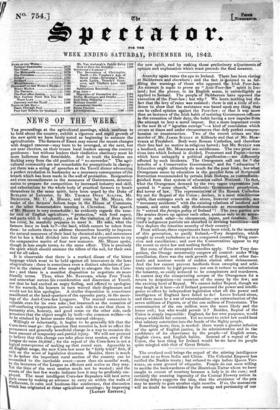NEWS OF THE WEEK.
THE proceedings at the agricultural meetings, which 'continue to be held about the country, exhibit a vigorous and rapid .growth of
the new spirit we have lately noted as beginning to animate the agriculturists. The farmers of Essex may resent the recent changes with dogged rancour—may burn to be revenged, at the next, but not near election, on their truant local leaders among the country gentlemen : but without leaders their vindictive obstinacy must be more ludicrous than formidable. And in truth the leaders are flocking away from the old position of " no surrender." The agri- cultural community are not remarkable for promptitude in change ; yet there was a string of speeches at the Yeovil dinner advocating a perfect revolution in husbandry as a necessary consequence of the breach which has been made in the wall of protection. Resignation and even reconcilement to the measures of Government, determi-
nation to prepare for competition by increased industry and skill, and exhortations to the whole body of practical farmers to bestir themselves in the same spirit, have been urged by the Duke of RUTLAND at Leicester, by Mr. THOMAS DYKE ACLA ND, Mr. DICKINSON, Mr. C. A. MOODY, and even by Mr. MILES, the leader of the farmers forlorn hope in the House of Commons, at the other Somersetshire meeting in Clevedon. The speech of Mr. MOODY is very remarkable : he evidently regards the tute- lar idol of English agriculture, " protection,' with fond regret, and parts with it reluctantly ; yet as the visitation of freer trade has come, he manfully prepares to meet it. He asks, what the farmers have to look to?—the land, which cannot be taken from them : he exhorts them to address themselves heartily to improve the natural resources of their land by chemical aids; and announces that he has a field divided into four parts, for experiments to try the comparative merits of four new manures. Mr. MILES spoke, i though in less ample terms, to the same effect. This is precisely the spirit which should animate the tillers of the soil, for their own and for all sakes.
It is observable that there is a marked disuse of the bitter language which wont to be held against all innovators in the laws of agriculture : there is sometimes even a distinct admission of jus- tice in the claims of those who sought to abrogate the late Corn- law ; and there is a manifest disposition to negotiate on more friendly terms. Thus, when Mr. SANFORD, whose Free Trade zeal somewhat outran his consideration and discretion at Yeovil, saw that he had excited an angry feeling, and offered to apologize for his warmth, his hearers in turn waived their displeasure and would not let him apologize. A similar disposition is sometimes manifested at the head-quarters of the opposite party, in the meet- ings of the Anti-Corn-law Leaguers. The mutual concession is valuable even for its own sake; but inasmuch as the cessation of self-confusing vituperation permits each side to see that there is humanity also, honesty, and good sense on the other side, each Perceives that the object sought by both—the common welfare—is to be attained by better means than mutual obloquy. Willingly or reluctantly, it begins to be generally felt that the Corn-laws mast go : the question that remains is how to effect the permanent and generally beneficial change in a way to occasion the least amount of temporary and partial injury. We will not pretend to believe that this change can take place next session, even if the League do raise 50,0001.; for the repeal of the Corn-laws is not a logical consequence of making up that round sum. Agreeably to all English usage, the new Corn-law must be "fairly tried" first, if only on the score of legislative decorum. Besides, there is much to do before the important rural section of the country can be
reconciled to the inevitable event—more than six months' work, be the lecturers of the League as efficient and active as they may. Yet the time of the next session needs not be wasted ; and the
events of the last few weeks indicate how it may be profitably em- ployed. The most intelligent Corn-law Repealers will best serve their cause by making an advance to carry on within the walls of Parliament, in calm and business-like conference, that discussion which has originated at these agricultural meetings; by improving Mr. Van Amburgh's Public Entry 1188 the new spirit, and by making those preliminary adju,stments of SPECTATOR'S LIBRARY— opinion and explanation which must precede the final measure.


























